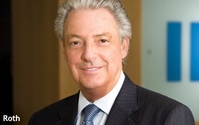IPG's Financial Shape: 'The Best It's Been In Years,' CEO Roth Says
- by Steve McClellan @mp_mcclellan, July 18, 2014
 Interpublic Group reported a 5.4% revenue gain in the second quarter to $1.85 billion with organic revenue growth -- which excludes the impact of acquisitions, divestitures and currency fluctuations
-- of 4.7%. Organic growth in the U.S. was 2.9%, while growth in other markets averaged 7.1%.
Interpublic Group reported a 5.4% revenue gain in the second quarter to $1.85 billion with organic revenue growth -- which excludes the impact of acquisitions, divestitures and currency fluctuations
-- of 4.7%. Organic growth in the U.S. was 2.9%, while growth in other markets averaged 7.1%.
Net income in Q2 was up 20% to $103.7 million.
For the first half, which IPG CEO Michael Roth said was “very solid overall,” revenue was up nearly 6% with organic growth of 5.6%. Net income nearly tripled to $81.3 million. The company’s financial position, Roth said, is “the best it’s been in years.”
Roth said that the company was on target to “exceed” previous full-year guidance that it would achieve organic growth of between 3% and 4%, although it cautioned analysts and investors on a Friday morning earnings call that second-half results would be “tempered” compared to the first half, given some 2013 client losses that the company has to cycle through.
advertisement
advertisement
In the second quarter, growth included increases across a broad range of client sectors such as retail, health care, financial services, automotive, and food and beverage, Roth reported on the call.
In the U.S., second-quarter growth was led by company’s digital specialists such as RG/A and Huge, Mediabrands, McCann and the PR-led Constituency Management Group.
Internationally, most regions produced substantive growth -- including the UK region, which had organic growth of 16.4%, while the Latin American region showed 7.4% growth with Asia-Pacific up 4.4%. The one weak spot remains struggling Continental Europe, which posted an organic decline of 1.4%. Results in the region continue to be inconsistent with some countries up (Germany and Spain) and others still in decline (France, Italy).
For the first half of the year, Roth said, “growth reflected positive contributions from advertising, digital, marketing services and media … As we have said previously, in addition to revenue growth, cost discipline and margin enhancement are a top priority for this year, and we are executing against that objective.”
Asked to comment on the ongoing media consolidation, Roth said it might provide added leverage to media owners and “make it more difficult to negotiate” with them. “But it adds to our value because that’s what we do.”
On the programmatic front, Roth described this week’s deal between ABC and Magna as an “experiment” and “not a large” one. Premium inventory, he added, will be the last to go programmatic. But he said that “eventually it will be a part of it. Automation is moving forward and collaboration is the way to do it.”


